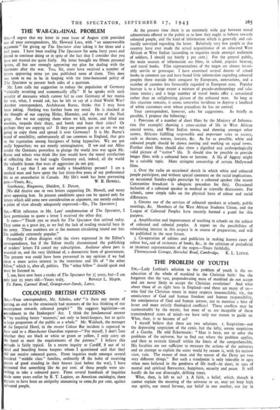COLOURED BRITISH CITIZENS
Sta,—Your correspondent, Mr. Scholes, asks' " is there any means of putting an end to the atrociously bad manners of the less thinking of our countrymen towards coloured people? " He suggests legislation—an amendment to the Innkeepers' Act. I think the fundamental answer is " by teaching better ' manners,' not only to hotel-keepers, but to quite a large proportion of the public as a whole." Mr. Walduck, the manager of the Imperial Hotel, in the recent Colour Bar incident is reported to have said to a Manchester Guardian reporter" For myself, I don't tare whether they are black or white or green or yellow, I only carry on the hotel to meet the requirements of the patrons." I believe this attitude is fairly typical. In a recent inquiry in Cardiff, 8 out of xi hotel and boarding house keepers whom I questioned said that they did not receive coloured guests. From inquiries made amongst several hundred "middle class" families, ordinarily ifl the habit of receiving guests of good standing in their houses (just before the war), I have estimated that something like 6o per cent. of those people were un- willing to take a coloured guest. From several hundreds of -inquiries made some years earlier by R. -T. Lapiere, an American sociologist, there appears to have been an antipathy amounting to some,8o per cent. against coloured people. At the present time there is an extremely wide gap between moral admonitions offered to the public as to how they ought to behave towards coloured people, and the kind of information which is generally and cul- turally conveyed regarding the latter. Relatively very few people in this country have ever made the actual acquaintance of an educated West African or West Indian (according to inquiries made amongst audienCes of soldiers, I should say barely 5 per cent.). For the general public, the main sources of information are films, in schobl, popular hearsay, and travel books. Film representations of the negro are almost invari- ably servile or grotesque. I have examined several dozens of school books in common use and have found little information regarding coloured peoples there outside their conquest by Europeans, annexations, and a number of customs less favourably regarded in European eyes. Popular hearsay is to a large extent a mixture of pseudo-anthropology and sala- cious stories ; and a large number of travel books offer a sensational rather than an enlightening picture of the coloured man. So long as this situation remains, it seems somewhat invidious to deprive a landlord of white customers over whose prejudices he has no control.
Your correspondent, however, asks for suggestions. As briefly as possible, I propose the following:
1. Provision of a number of short films by the Ministry of Informa- tion (for example) showing a cross-section of life in West African coastal towns, and West Indian towns, and showing amongst other scenes, Africans .fulfilling responsible and important roles in society, such as doctors, nurses, lawyers, &c. As far as possible, white and coloured people should be shown moving and working on equal terms. Further short films should also show a dignified and anthropologically valid picture of " native " life. It should also be possible to provide longer films with a coloured hero or heroine. A life of Aggrey might be a suitable topic. More stringent censorship of certain Hollywood films.
2. Over the radio an occasional sketch in which white and coloured beople participate, and without special comment on the racial implications. an occasional Sunday-night postscript by a coloured speaker (the recent Constantine broadcast is adequate precedent for this). Occasional inclusion of a coloured speaker in medical or scientific discussions. For schools, some simple talks on the physical basis of colour and racial differences.
3. Greater use of the services of coloured speakers at schools, public meetings, &c. Members of the West African Students Union, and the League of Coloured Peoples have recently formed a panel for this purpose.
4. Amplification and improvement of teaching in schools on the subject of coloured and colonial peoples. A report on the possibilities of stimulating interest in this respect is in course of preparation, and will be published in the near future.
5. Co-operation of editors and publicists in making known cases of colour bar„ and of reviewers of books, &c., in the criticism of prejudicial or incorrect representations of the negro.—Yours faithfully,
Thorneycreek Cottage, Herschel Road, Cambridge. K. L. LIME.


























 Previous page
Previous page